Salesforce Service Cloud: Customer Service Software Powered By AI
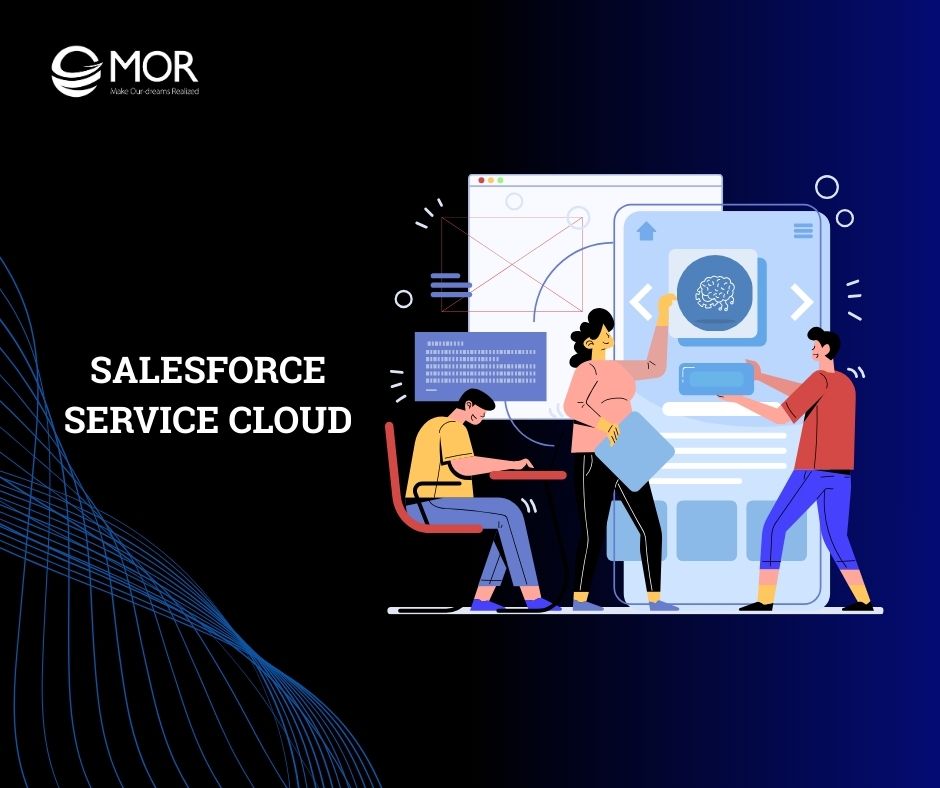
In today’s digital era, customer expectations are higher than ever. Slow responses, fragmented channels, and manual processes often lead to poor service experiences. Salesforce Service Cloud is a powerful solution to transform how businesses manage customer support. In this MOR Software's guide, we’ll explore everything about Service Cloud to help business owners evaluate its potential for their organization.
What Is Salesforce Service Cloud?
Salesforce Service Cloud is a customer service management platform within the Salesforce Services ecosystem. Unlike traditional support systems that merely log requests, Service Cloud focuses on streamlining case resolution workflows, automating repetitive tasks, and providing real-time data insights for faster decision-making.
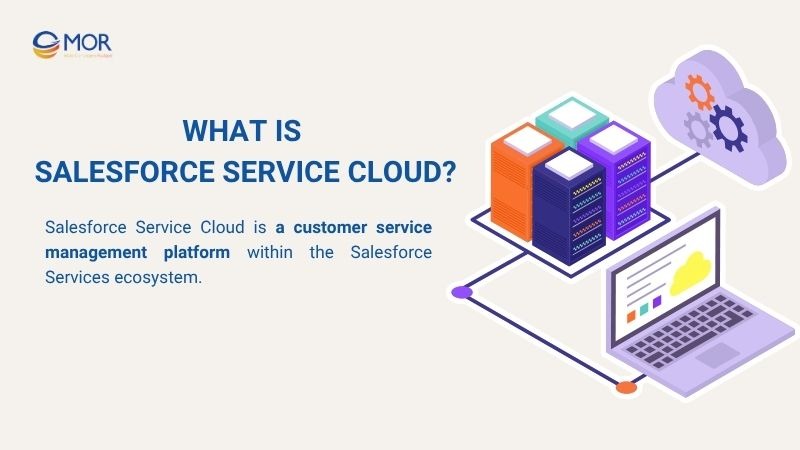
Who should use Salesforce Service Cloud?
From growing startups to large enterprises, any business that prioritizes customer experience can benefit from Salesforce Service Cloud. Especially for organizations managing multi-channel support or seeking to standardize service quality at scale, a well-executed Salesforce Service Cloud implementation can completely transform customer engagement operations.
Key Features Of Salesforce Service Cloud
Salesforce Service Cloud is a powerful customer service platform designed to meet the evolving demands of modern businesses. Below are the core features that make Salesforce cloud services an essential solution for organizations looking to enhance support operations:
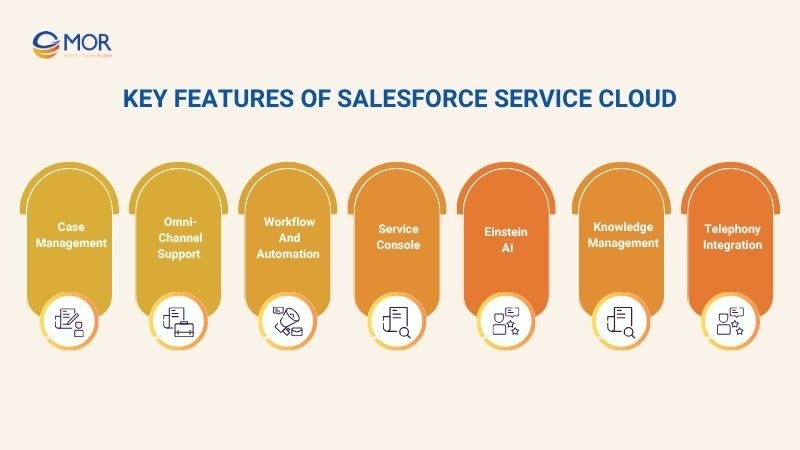
Case Management
Case Management lies at the heart of Salesforce Service Cloud. It enables businesses to track, prioritize, and resolve customer issues efficiently. Each case, whether submitted via email, live chat, web form, or social media, is automatically categorized, prioritized, and routed to the appropriate agent or queue.
Salesforce Service Cloud provides real-time dashboards that allow businesses to monitor the status of each case, track SLA compliance, and measure response rates. With this feature, companies can standardize how service requests are handled across all channels, reducing errors and increasing transparency.
Omni-Channel Support
In the digital age, customers expect to connect with businesses through any channel, whether it’s phone, SMS, email, live chat, or social media. Omni-Channel Support is a key feature of Salesforce Service Cloud that unifies all customer interactions into a single, centralized interface.
Instead of switching between multiple tabs or disjointed systems, agents can handle all communications in one place. This streamlines the support process, reduces handling time, and minimizes errors caused by fragmented context.
For example: A customer may send a Facebook message in the morning and follow up with a phone call later that day. Thanks to Omni-Channel Support within service cloud applications, Salesforce, the complete interaction history is seamlessly recorded, allowing the agent to quickly understand the issue without requiring the customer to repeat themselves.
Workflow And Automation
One of the key strategic advantages of Salesforce Service Cloud is its highly flexible salesforce workflow and automation capabilities. Automation helps assign cases based on agent skills, send timely task reminders, and escalate overdue issues, ensuring each request reaches the right person at the right time.
Service Console
The Service Console is an integrated workspace designed specifically for support agents, allowing them to access all necessary information and tools within a single screen. Instead of switching between multiple applications or windows, agents can easily view customer history, update case statuses, and use macros to automate repetitive tasks.
For example, when a customer submits a support request about a missing order, the agent can quickly open the related case in the Service Console, track the entire delivery journey, and identify any issues with the shipping carrier to respond promptly. At the same time, the agent can use macros to automatically send confirmation emails and guide the customer through the next steps, saving time and ensuring a consistent handling process.
Einstein AI
Einstein AI is the built-in artificial intelligence engine within Salesforce Cloud Services, designed to enhance the intelligence and efficiency of customer service operations. Unlike rule-based automation, Salesforce cloud services powered by Einstein go beyond scripted responses. The system uses natural language processing (NLP) to analyze customer messages, detect sentiment, determine case priority, and route inquiries to the right department automatically.
Example: When a customer submits a case saying, “I’m extremely frustrated because my order hasn’t arrived,” Einstein AI can:
- Detect negative sentiment through key phrases like “extremely frustrated,”
- Automatically assign a high-priority level to the case,
- Route it directly to the operations or logistics team
- Send an alert to a supervisor for proactive intervention.
Knowledge Management
Knowledge Management in Salesforce Service Cloud provides a centralized repository to efficiently create, organize, and share knowledge articles. This feature enables support agents to quickly find and access answers to common customer questions, reducing resolution time and improving overall service quality.
Additionally, Knowledge Management supports self-service portals, allowing customers to independently search for information and solutions, which helps lighten the support team’s workload. With AI integration, the system automatically recommends relevant content, enhancing the experience for both customers and support agents.
Telephony Integration
Telephony integration enables support agents to make and receive calls directly within the Service Cloud console without switching to other applications. For example, a customer service agent can answer incoming calls from customers right in the workspace, streamlining communication and improving efficiency.
During calls, the system automatically records conversations to ensure all information is accurately captured. If agents need to call customers back, they can simply click the phone number in the customer’s profile to initiate a call instantly. Additionally, call logging features track the entire interaction history, making it easier to manage and evaluate service quality.
Business Benefits Of Salesforce Service Cloud
Implementing Salesforce Service Cloud is more than just a technological upgrade; it’s a strategic move to elevate overall business performance. Below are some of the key benefits organizations can unlock with a well-executed Salesforce Cloud Services implementation.
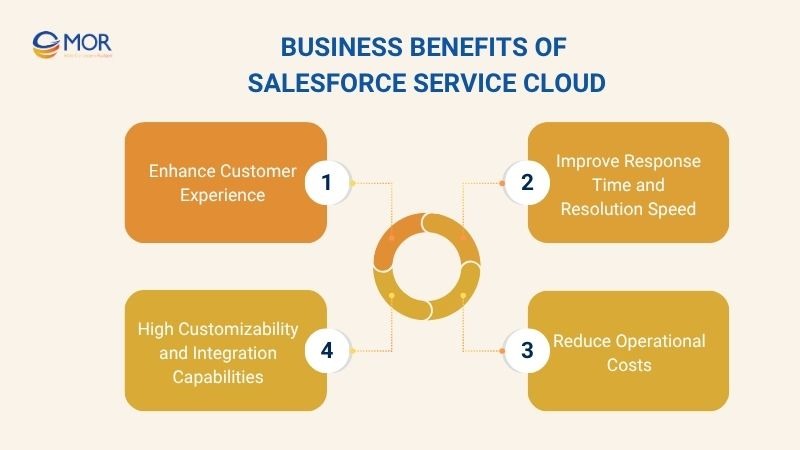
Enhance Customer Experience
Customer experience is a critical survival factor in today’s competitive landscape. Salesforce Service Cloud helps businesses deliver consistent, personalized support across every channel.
With its omnichannel support and unified interface, agents can manage all interactions in one place, without switching tabs or losing context. Features like AI-powered recommendations, self-service portals, and customer history tracking enable faster, more relevant responses.
Improve Response Time And Resolution Speed
In large enterprise environments, customer inquiries often require multiple layers of verification, approvals, or interdepartmental coordination. With pre-built rules, when an agent receives a technical request, the Salesforce Service Cloud automatically routes the case to the relevant engineering team. Then, assigns a priority level and notifies the supervisor if the case isn't addressed within the defined SLA.
Beyond saving operational time, automation plays a crucial role in standardizing service quality at scale. Workflow automation software reduces data entry errors by 37% and improves data accuracy by up to 88%, outperforming manual methods, and making it a vital component in successful Salesforce Cloud Services implementation.
Reduce Operational Costs
Salesforce Service Cloud helps businesses reduce operational costs by automating repetitive tasks and minimizing reliance on traditional support staff. Instead of requiring a large team to manually handle every customer inquiry, the system can automatically assign cases, send notifications, and route requests efficiently.
Schneider Electric saved $2.7 million in IT costs over three years after implementing Salesforce — a powerful testament to the operational efficiency gained through intelligent integration and workflow automation with the Salesforce Service Cloud. This capability is a core strength of Salesforce Service Cloud, enabling companies to streamline support operations while maintaining high service quality.
High Customizability And Integration Capabilities
Unlike many “off-the-shelf” customer support platforms, Salesforce Service Cloud offers deep customization tailored to each industry and unique business process. Companies can redesign the entire case lifecycle, create custom fields, define branching logic, and build specific workflows to match their internal operations.
Moreover, Salesforce Service Cloud supports seamless integration with existing systems via robust APIs or ready-made solutions on the Salesforce AppExchange. This high degree of flexibility makes it an ideal choice for businesses with complex service models or industry-specific requirements.
Salesforce Service Cloud Vs Sales Cloud: What’s The Difference?
Criteria | Salesforce Service Cloud | Sales Cloud |
Primary Purpose | Focuses on managing and resolving customer support requests to improve customer satisfaction and loyalty after sales. | Focuses on managing the sales process, from lead generation to closing deals, to boost revenue. |
Target Users | Customer service agents, technical support teams, and case managers handle customer inquiries and issues. | Sales representatives, sales managers, business development teams, and account managers. |
Key Features | Case management, multi-channel support (email, phone, chat, social media), AI-powered chatbots, knowledge base, and workflow automation for service processes. | Lead management, opportunity tracking, sales pipeline management, sales forecasting, and performance analytics. |
AI Capabilities | AI-driven case routing, sentiment analysis, predictive customer needs, and relevant knowledge article recommendations to assist agents. | AI-powered sales forecasting, customer behavior analysis, personalized sales recommendations, and automation of repetitive sales tasks. |
User Interface | Service Console – a unified workspace that enables agents to manage all customer interactions and cases in one screen for faster resolution. | Sales Console – a centralized interface to manage leads, opportunities, and sales activities efficiently. |
Integrations | Seamless integration with communication channels like phone, email, social media, and chatbot platforms to deliver smooth customer support. | Integrates with marketing automation, email platforms, CRM systems, and campaign management tools to enhance sales workflows. |
Ultimate Goal | Enhance customer experience, reduce issue resolution time, and increase customer retention and satisfaction. | Increase sales productivity, improve deal closure rates, acquire new customers, and maximize revenue. |
Salesforce Service Cloud Implementation Process
To successfully implement Salesforce cloud services, businesses must follow a well-defined process, from requirement analysis to continuous optimization. This section outlines the essential steps for a smooth and effective deployment.
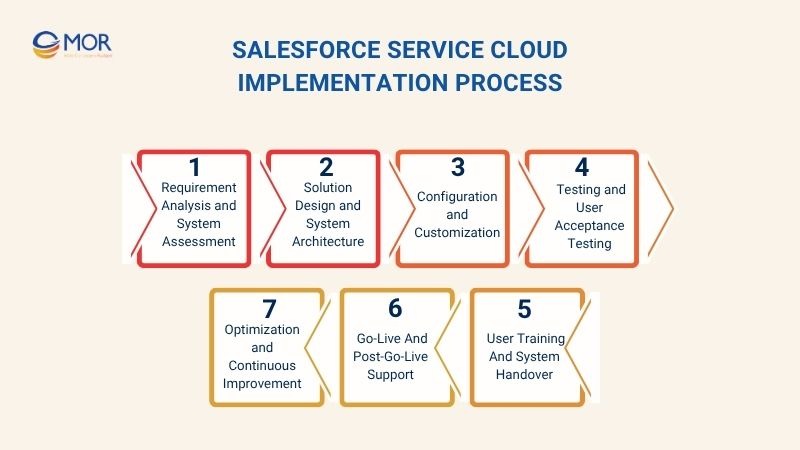
Phase 1: Requirement Analysis And System Assessment
A successful Salesforce Service Cloud implementation starts with clearly defining your business goals. Since every organization has different service needs, identifying these objectives early will help shape the overall strategy and ensure you select the right service cloud applications Salesforce offers.
To clarify these goals and pain points, consider asking:
- What are the current bottlenecks in the customer service process?
- Where does the support team need better tools or automation?
- Which performance KPIs need improvement with Salesforce Service Cloud?
- What are customers expecting in terms of response time and support quality?
- How many service channels are in use, and are they integrated?
Once you understand your current workflows, the next critical step is to identify the gaps between existing operations and your desired outcomes. This gap analysis will reveal differences in processes, people, and technology, highlighting what needs to change when adopting Salesforce cloud services.
Phase 2: Solution Design And System Architecture
Once business goals and system gaps are clearly defined, the next step is to design a tailored solution. Start by mapping out the end-to-end customer service processes, including the case lifecycle, escalation paths, and SLAs.
Based on these mapped processes, select the most relevant features from Salesforce Service Cloud, such as:
- Case auto-assignment
- Omnichannel routing
- Macros for quick responses
- Live chat support.
Choosing the right service cloud applications Salesforce offers is critical to avoid unnecessary features while ensuring that every user role has the tools they need.
Next, outline the system architecture and plan for data integration with your existing platforms. A solid integration framework allows all customer data to flow seamlessly, enabling your team to deliver consistent and real-time service.
Phase 3: Configuration And Customization
This phase involves configuring the core components of Salesforce Service Cloud to prepare the system for real-world operations. The first step is setting up essential objects such as Case, Account, Contact, and Queue.
Automation must be configured to ensure consistent workflows across teams:
- Assignment rules to route cases to the right team member
- SLA policies to manage response time commitments
- Escalation rules to handle overdue cases efficiently
Depending on the industry, teams may also integrate Salesforce Financial Services Cloud or align with tools from Salesforce Marketing Cloud Services to provide more personalized customer engagement.
Phase 4: Testing And User Acceptance Testing (UAT)
Once the system has been configured, it's critical to perform comprehensive testing across key service scenarios. The goal is to ensure that Salesforce Service Cloud functions as designed and aligns with real-world business needs.
Testing should include:
- The complete service process: case creation, handling, response, and closure
- Automated flows: case assignment, SLA enforcement, and escalation rules
- Multi-channel support: email, live chat, social media, telephony
- Role-based access and Lightning interface usability
Businesses should conduct testing with a select group of internal pilot users. These users interact with service cloud applications in their daily workflow and provide feedback on usability issues, missing features, or friction points.
Phase 5: User Training And System Handover
Successful adoption of Salesforce Service Cloud depends heavily on how well users understand the system. This phase focuses on equipping different user groups with the knowledge they need to operate confidently.
Training should be practical and aligned with real service workflows. Materials can include manuals, video tutorials, and quick-start guides tailored to each role.
To support long-term success, it’s also recommended to identify internal champions. These individuals can assist colleagues post-deployment and help reinforce proper system usage.
Phase 6: Go-Live And Post-Go-Live Support
The go-live marks the official launch of the Salesforce Service Cloud system into a live production environment. During go-live, businesses should monitor system performance, track how users are engaging with the platform, and be ready to address any technical issues that may arise.
This is commonly referred to as the "hypercare" period, during which the support team provides rapid assistance and resolves early-stage issues. Their expertise can help troubleshoot unexpected errors, adjust workflows, and ensure the system is fully aligned with your operational goals.
Phase 7: Optimization And Continuous Improvement
Once the system has stabilized, businesses should enter a continuous improvement cycle to fully leverage the power of Salesforce Service Cloud. This involves ongoing monitoring of key performance metrics to identify bottlenecks and opportunities for refinement.
Important metrics to track include:
- First Response Time (FRT)
- Case Resolution Time
- SLA compliance rate
- Escalation rate
- Customer satisfaction scores (CSAT/NPS)
- Case reopen rate
- Volume of cases by channel (chat, email, phone, etc.)
Insights from these metrics help guide decisions such as adding advanced features within Salesforce cloud services, optimizing workflows or refining the Lightning interface to improve usability.
How Does Salesforce Service Cloud Work Across Different Industries?
Salesforce Service Cloud isn’t just a one-size-fits-all solution, it’s a flexible, scalable platform designed to meet the unique customer service demands of each industry. This section explores how different service cloud applications are used in their daily workflows.
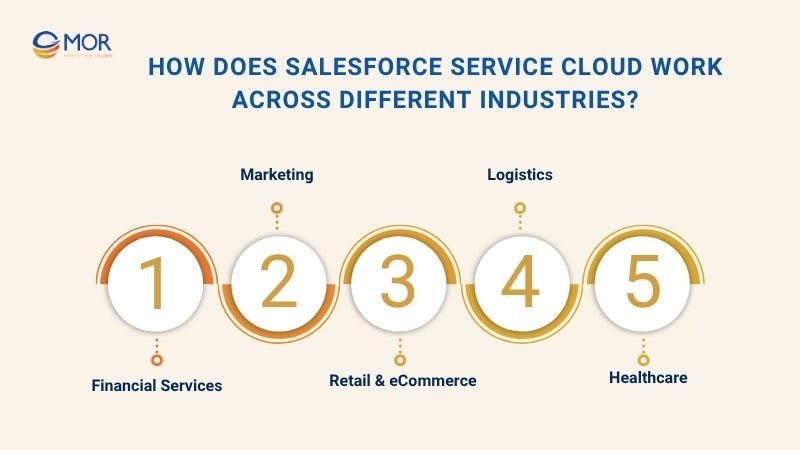
Financial Services
In the financial services sector, where compliance and responsiveness are critical, finance CRM software empowers banks, insurance providers, and fintech firms to deliver secure and efficient customer service. Service agents gain a complete 360-degree view of each customer, including financial history, account details, open cases, and interaction records.
Example Scenario: A VIP client contacts the bank to complain about a delayed international transfer.
How Service Cloud handles it:
- The caller is automatically identified as a VIP using data from Salesforce Financial Services Cloud.
- The call is routed to a senior agent through omnichannel routing rules.
- All related financial data and past support cases are instantly displayed via the Lightning console.
- A new case is auto-generated, with a high-priority SLA attached.
- If not resolved in time, the case is escalated according to predefined escalation paths.
- Once the issue is resolved, the case is closed, and the client receives an automated status update.
Marketing
Marketing teams must respond quickly and strategically to public feedback while ensuring messaging personalization. With Salesforce Marketing Cloud services integrated with Marketing Cloud, brands can manage inbound messages, control reputational risks, and deliver tailored follow-up all while protecting brand integrity.
Example Scenario:
A manufacturing client receives an irrelevant marketing email targeting the education sector. Frustrated, they post negative feedback on LinkedIn.
Workflow:
- The LinkedIn comment is captured via Social Studio and logged as a “Brand Risk – High” case
- The case routes to customer experience managers for immediate action
- Agent confirms the client’s actual industry segment (B2B Manufacturing) and updates CRM records
- A personalized apology call is made, with corrected materials sent through a tailored campaign
- The case is monitored until the customer updates or removes the negative post
Retail & E-Commerce
In the retail CRM and e-commerce space, customer expectations revolve around real-time responses and consistent multi-channel support. Businesses need an integrated system to synchronize order data, inventory, delivery status, and customer care—something Salesforce Service Cloud enables through seamless CRM-to-operations integration.
Example Scenario: A customer purchases shoes online but receives the wrong size. They contact the support team via live chat, requesting an exchange before a holiday deadline.
How Salesforce Service Cloud handles it:
- The chat request is automatically logged as a case with the label "Exchange – Urgent".
- Service Cloud pulls order data from the connected eCommerce system
- The agent checks real-time inventory for the correct size directly in the Lightning Console
- A macro triggers an email with a return shipping label and auto-generates a replacement order
- The case remains open until the exchange is successfully delivered and confirmed
Logistics
The logistics industry operates under strict delivery timelines, multi-party coordination, and the constant risk of shipment delays or damages. Customers, both B2B and B2C, expect accurate tracking, fast response to disruptions, and clear communication at every step of the delivery chain.
With Salesforce Service Cloud, logistics providers can centralize service operations by integrating data from GPS, warehouse systems, and transport ERPs.
Example Scenario:
A corporate customer receives a shipment of fresh produce, but it arrives spoiled due to temperature fluctuations in the container.
How Salesforce Service Cloud handles it:
- The customer files a case through a service portal, tagged as “Perishable damage.”
- The agent accesses IoT sensor logs to review the temperature history
- Anomaly detected: A temperature breach occurred for 3 hours at a depot in Ho Chi Minh City
- The case is escalated to the regional operations head via predefined rules
- Compensation is triggered based on the SLA policy, and a refund code is issued to the customer
Healthcare
In healthcare, accuracy and trust are paramount. Patients expect timely responses and secure data handling. Salesforce Service Cloud supports healthcare providers with seamless integration, all within a secure, HIPAA-compliant environment.
Example Scenario: A patient books a cardiology appointment online but does not receive a confirmation email. Concerned, they call the hospital, fearing they’ll miss the urgent consultation.
Workflow:
- The patient’s call is identified via CTI integration and auto-logged
- The agent accesses the integrated hospital information system (HIS) and finds a typo in the email address
- Email is corrected, confirmation resent, and an SMS reminder sent via Omni-Channel tools
- A macro delivers a pre-appointment preparation guide
- The case is closed after confirming the patient completed their visit
Salesforce Service Cloud Pricing And Tiers
Many businesses hesitate when choosing Salesforce Service Cloud due to unclear implementation costs. The section below will help you better understand the pricing structure and any potential additional fees.
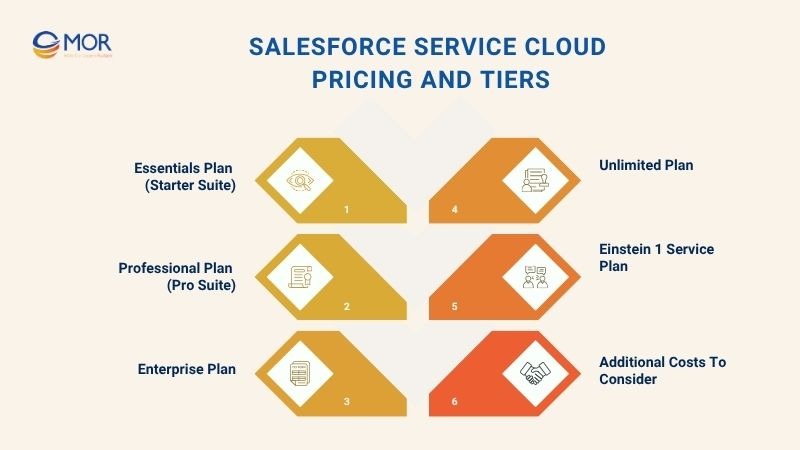
Essentials Plan (Starter Suite)
The Essentials Plan is an ideal entry-level option for small businesses just beginning to implement a customer service system. This package includes core features like case management, email-to-case and web-to-case integration, basic reporting, and mobile access. While it has limited automation and customization, it provides everything a small team needs to streamline customer support operations.
Price: $25/user/month (billed annually)
Best for: Small businesses, startups, or customer support teams looking for a simple and cost-effective way to digitize their customer service.
Professional Plan (Pro Suite)
The Professional Plan is an advanced step designed for growing businesses. In addition to all features from the Essentials package, it adds Omni-Channel routing, skill-based case assignment, macros for automating repetitive tasks, an integrated Service Console, SLA management, and telephony integration.
Price: $100/user/month (billed annually)
Best for: Mid-sized businesses seeking to boost support team productivity and implement efficient multichannel customer service.
Enterprise Plan
The Enterprise Plan offers powerful customization capabilities, ideal for organizations with complex service workflows. Businesses can build custom workflows, integrate with external systems via API, set up branded Help Centers, and manage multiple departments and teams.
Price: $165/user/month (billed annually)
Best for: Large or scaling enterprises requiring high flexibility, scalable architecture, and full control over the entire customer service journey.
Unlimited Plan
The Unlimited Plan is the most comprehensive Salesforce Service Cloud offering. It includes all features from previous tiers and expands on them with powerful tools such as Knowledge Management, Einstein AI, intelligent chatbots, messaging integration, a full developer sandbox, complete training resources, and 24/7 premier support.
Price: $330/user/month (billed annually)
Best for: Global enterprises with high demands for performance, scalability, and premium-level technical support.
Einstein 1 Service Plan
Einstein 1 Service is the highest-level tier in the Salesforce Service Cloud offering. It combines all features from the Unlimited Plan with next-generation AI capabilities such as Salesforce Copilot, Data Cloud integration, and real-time collaboration through Slack.
Price: $500/user/month (billed annually)
Best for: AI-first enterprises looking to unify data, accelerate service delivery, and gain a competitive edge through smart automation.
Additional Costs To Consider
While the standard packages of Salesforce Service Cloud include a wide range of powerful features, businesses should be aware of potential additional costs that may arise during the implementation and operation of the system. These expenses vary depending on the level of customization, integration requirements, and the scale of internal support needed.
Some common additional costs include:
- Third-party integrations: Connecting Salesforce cloud services to external systems such as ERP, eCommerce platforms, or payment gateway integration may require middleware or custom API development.
- Customizations: Building custom workflows, dashboards, or internal apps typically requires Salesforce developers or technical consultants, which adds to the Salesforce Service Cloud implementation budget.
- Training and onboarding: Salesforce offers optional training packages (online or onsite), especially useful for companies new to Salesforce service cloud applications Salesforce or those with large customer support teams.
- Data storage and API limits: Exceeding the default limits for data storage, file capacity, or API calls can result in additional charges on top of your subscription fees.
In Conclusion
Salesforce Service Cloud is a comprehensive solution that helps businesses improve service efficiency.. From retail and logistics to healthcare, every organization can tailor Service Cloud to match its unique operational needs. If your business is considering implementing, please contact the consulting team at MOR Software to kick-start your customer service transformation journey today.
MOR SOFTWARE
Frequently Asked Questions (FAQs)
Can I try Salesforce Service Cloud for free before making a purchase?
Yes, Salesforce offers a free trial without requiring a credit card.
Is Salesforce Service Cloud suitable for small businesses?
Yes, the Essentials plan is designed for small teams and startups.
Do I need technical knowledge to set up the free trial?
No, the setup is guided and user-friendly, even for non-technical users.
Can I integrate Salesforce Service Cloud with my existing CRM or tools?
Yes, it supports integrations with CRM, ERP, telephony, and more.
Rate this article
0
over 5.0 based on 0 reviews
Your rating on this news:
Name
*Email
*Write your comment
*Send your comment
1